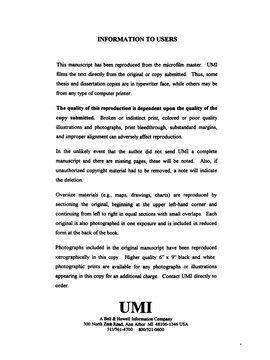| dc.contributor.advisor | Sankowski, Edward, | en_US |
| dc.contributor.author | Moore, Harry L. | en_US |
| dc.date.accessioned | 2013-08-16T12:30:09Z | |
| dc.date.available | 2013-08-16T12:30:09Z | |
| dc.date.issued | 1998 | en_US |
| dc.identifier.uri | https://hdl.handle.net/11244/5688 | |
| dc.description.abstract | Such a commingling of theoretical elements, under the claim of being utilitarian, may seem ambiguous, however, it is my contention that such inclusions only serve to enhance the plausible nature of this sphere-specific form of utilitarianism and the adjudication of rights. Additionally, though there are other components of theories included, the basis of utilitarianism still serves as the foundation by which all other actions, decisions, and values are judged. | en_US |
| dc.description.abstract | This dissertation serves as a monograph on the moral and social implications of a utilitarian-based system of health care which recognizes and takes rights seriously. Though the design and claims are stated primarily in terms of utilitarianism, admittedly, there are elements of communitarian, deontological, and rights theories which have been incorporated. | en_US |
| dc.description.abstract | The classical view of utilitarianism is too broad in its scope of defining "the greatest good" or realm of value. But to narrow the area of value to a particular sphere or environment allows for the utility and associated rights in question to be identified, the value measured, and the success more easily interpreted. | en_US |
| dc.description.abstract | While it is true that utilitarianism offers a standard for all areas of life, the idea of examining a sphere or environment of utility, in this case, the utility associated with the sphere of health care, allows for the good to be clearly defined. One primary weakness of classical utilitarianism is that it ignores, or at least does not do full justice to, the notion of personal responsibility or sense of obligation. If the only duty or requirement is to produce some obscure sense of the "greatest good" or the "greatest happiness, " the question of how the good is identified and who is to have the good remains unanswered by the traditional utilitarian construct. | en_US |
| dc.description.abstract | While maintaining the general premise of utilitarianism, that is, "the greatest good for the greatest number, " the notion is not from some nebulous concept or subjective position about life or feelings in general. This sphere-specific position also acknowledges and defines the "rights" of the individual within the particular sphere being considered, in this case, the sphere of health care. | en_US |
| dc.format.extent | ix, 198 leaves : | en_US |
| dc.subject | Health care. | en_US |
| dc.subject | Utilitarianism. | en_US |
| dc.subject | Philosophy. | en_US |
| dc.subject | Health Sciences, Health Care Management. | en_US |
| dc.title | The adjudication of utilitarianism and rights in the sphere of health care. | en_US |
| dc.type | Thesis | en_US |
| dc.thesis.degree | Ph.D. | en_US |
| dc.thesis.degreeDiscipline | Department of Philosophy | en_US |
| dc.note | Chair: Edward Sankowski. | en_US |
| dc.note | Source: Dissertation Abstracts International, Volume: 59-09, Section: A, page: 3494. | en_US |
| ou.identifier | (UMI)AAI9905604 | en_US |
| ou.group | College of Arts and Sciences::Department of Philosophy | |
